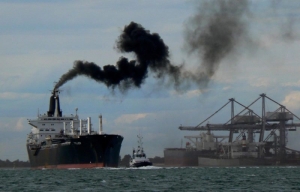


(Posted on 22/09/20)
INTERCARGO believes that the inclusion of shipping in the EU Emissions Trading System (ETS), which European lawmakers have recently supported, has ignored their calls and calls from the industry as a whole, for collaboration and adapted solutions to achieve the much needed reduction in Greenhouse Gas (GHG) emissions for greener shipping. Far from being a meaningful contribution towards meeting those objectives, this move is, instead, a confirmation of how distanced the thinking of European decision-makers is from the global dimensions of the shipping sector, said INTERCARGO is a statement.
INTERCARGO (The International Association of Dry Cargo Shipowners) represents the interests of quality dry bulk shipowners, with close to 2,400 registered ships out of more than 11,000 ships in the global dry bulk fleet, corresponding to over 25% of the global dry bulk fleet basis deadweight.
INTERCARGO’s statement continues: Global challenges and problems require global handling and solutions: The International Maritime Organization (IMO) works to ensure a level playing field globally unlike European or other regional regulations. The latter have proven ineffective, as they create distortions and multi-tier markets, or even trade tensions. A thorough impact assessment on the inclusion of shipping in EU ETS is imperative.
The EU ETS risks causing trade retaliation, an increase in emissions and the decline of European ports. There is a danger that trans-shipment centres will be set up just outside EU borders and served by large, efficient bulk vessels. Smaller, less GHG efficient ships will then transport cargoes to EU ports which will lose efficiencies gained through technology and size. In short, carbon leakage will take place.
The challenge to decarbonise shipping is enormous. IMO’s initial strategy and the adoption of the GHG Roadmap focuses on the implementation of short, medium, and long-term measures. Shipowners have responded responsibly to the challenge by putting forward the USD 5bn R&D fund proposal as a much needed longer-term complementary contribution to set in motion the chain of innovation, investment, production, and adoption by the marketplace of innovative technologies and energy carriers.
“The industry needs fuel/energy suppliers, engine manufacturers, shipbuilders and charterers to achieve IMO’s objectives,” said INTERCARGO Secretary General Kostas Gkonis. “Bringing these key stakeholders aboard has arguably been the greatest challenge for IMO. One more challenge has now been added: changing the thinking of narrow-minded regional decision-makers and persuading them to see the broader picture. The inclusion of shipping in EU ETS is basically a money collection mechanism, fundamentally disconnected from the work at IMO, and risks undermining a global GHG solution.”
AtoB@C Shipping, a subsidiary of ESL Shipping, has announced the successful delivery of Fleximar, the... Read more
Western Bulk, together with reputable Norwegian partners A/S J. Ludwig Mowinckels Rederi, Premium Maritime... Read more
Pacific Basin Shipping Limited, one of the world’s leading dry bulk shipping companies, has announced... Read more
Columbia Group anticipates a period of strong expansion as an increasing number of international shipowners... Read more
Norse?Ship Management has expanded its use of Smart Ship Hub’s high frequency sensor data and... Read more
As the maritime industry gears up to welcome the IMO’s STCW bullying and harassment training amendments... Read more
NORDEN has acquired the cargo activities of Taylor Maritime in Southern Africa (previously operated... Read more
Philippos Ioulianou, Managing Director of EmissionLink, has warned the IMO’s decision to delay... Read more
VIKAND has highlighted the need for cultural change in the maritime sector as reports of bullying, harassment... Read more
The maritime industry is experiencing a period of significant transformation, driven by rapidly evolving... Read more